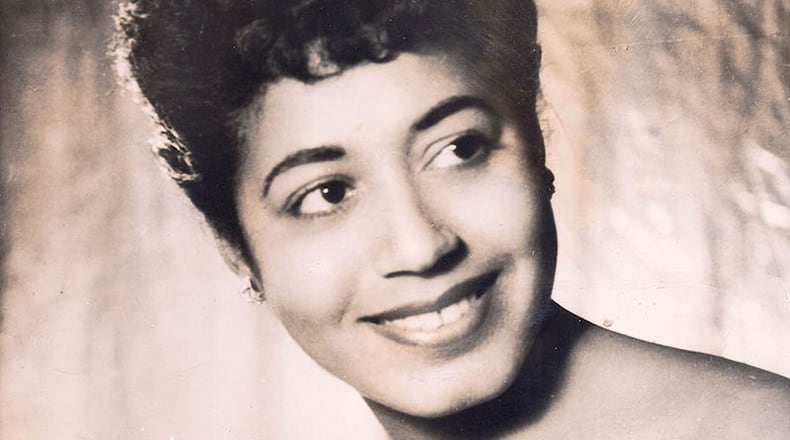When Maynard Jackson was inaugurated as Atlanta and the South’s first Black mayor in 1974, he could have had a pick of singers to perform at the historic event.
He decided to go with a voice teacher at Spelman College. Not any voice teacher but an opera singer, who two decades earlier in 1953, became the first African-American to perform a lead role, as Elvira in “L’italiana in Algeri,” at La Scala Opera House in Milan.
He decided to go with his aunt, Mattiwilda Dobbs.
Standing on stage in a stunning gown, she sang for her nephew the old hymn, “He’s Got the Whole World in His Hands.”
The story of Mattiwilda Dobbs is part of the great American story of the family of John Wesley Dobbs, the civic and political leader known as the “Mayor of Auburn Avenue.”
A coloratura soprano, her vocal technique was described as pure and resonant as a bell. Her interpretations and stage presence were legendary.
“She was a captivating performer with an extraordinarily beautiful voice. But she was also an extremely humble person,” said her nephew Dobbs Jordan. “She could go on stage and assume any role. But offstage, she was the complete opposite.”
In the 1950s, she rose to international fame as one of the first African-American opera singers to perform on major stages around the world, paving a path for Leontyne Price, Kathleen Battle and Augusta’s Jessye Norman.
But like many Black artists of her generation, Dobbs had to first go to Europe to be recognized for her brilliance on stages in London, Geneva, Paris, Vienna, Hamburg and Stockholm. It wasn’t until after her 1953 performance at La Scala Opera House, that she made her American debut with the Little Orchestra Society in New York City.
In 1955, she became the first African-American to play a lead role at the San Francisco Opera. In 1956, she made her debut as Gilda in “Rigoletto” with the Metropolitan Opera – a year after contralto Marian Anderson broke the color barrier.
She became the first Black singer to be offered a long-term contract by the Met, where she sang 29 times in six roles during eight seasons.
But it was not until 1962, after worldwide acclaim, that she would perform in her hometown of Atlanta because she refused to sing in front of segregated audiences.
Roses and a key to the city
Born in 1925, she was the fifth of Dobbs’ six daughters, all of whom attended Spelman College.
All of the daughters started playing the piano at an early age and as a child, even though she was shy and self-effacing, Dobbs took a keen interest in singing. She was only six years old when she sang her first solo for the choir at First Congregational Church in Atlanta.
Credit: Dobbs and Michelle Jordan
Credit: Dobbs and Michelle Jordan
“I would never have been a singer if it were not for my father,” Dobbs said in her writings. “I was too shy. He always supported me and always encouraged me to go on.”
She graduated with a music degree in 1946 from Spelman College where she was the class valedictorian.
After leaving Spelman, Dobbs won scholarships to study at the Mannes College of Music and the Berkshire Music Center’s Opera Workshop. She received her master’s degree at Columbia University in New York City and later moved to Paris to study with Pierre Bernac.
Credit: Dobbs and Michelle Jordan
Credit: Dobbs and Michelle Jordan
As a child, Dobb’s father forbade her and her sisters from going to segregated theaters, a sentiment passed down to the proud Maynard Jackson. This was part of the reason why she didn’t perform in Atlanta until 1962, when she sang before an integrated house at the old Municipal Auditorium.
“She was a person of principle, who was raised in a household that held such values,” said Dobbs Jordan. “So being so humble, proud and grounded, you could see why she would never perform before a segregated audience.”
At the end of the Municipal Auditorium concert, Mayor Ivan Allen joined her on stage and gave her a bouquet of roses and the key to the city. In the audience, her 24-year-old nephew Maynard Jackson, cheered.
Credit: SPECIAL
Credit: SPECIAL
A beautiful human being
“Aunt Mattiwilda was very much like daddy, of having this strong presence about her,” said Jackson’s daughter Alexandra Jackson Harris. “I was young when I would see her the most. But what I always remember about her was her grace and poise. She was so classy and spoke with a voice that sounded melodic.”
Of all of the Dobbs’ heirs, Alexandra Jackson Harris is perhaps the closest to having followed in Mattiwilda Dobbs’ artistic footsteps. An acclaimed singer and performer, she has released two jazz albums, including “Legacy and Alchemy,” which featured Rod Templeton and Al Jarreau.
But she is still amazed at how people look at her in awe whenever she reveals that she is the great-niece of Mattiwilda Dobbs.
She also remembers family gatherings where everyone would sing the blessings before they ate. Dobbs was the conductor of the sing-a-long, but also basked in the glory of watching her family perform.
“I never saw ego with Aunt Mattiwilda,” said Harris, who has performed at both the Atlanta and Montreaux jazz festivals. “She had this look in her eyes that just made you feel like you were looking into her heart. Being able to see, in her, the love that she had, made me see how she was able to translate that love on stage. And I carry that.”
After Jackson’s 1974 inauguration, Dobbs semi-retired from the stage and became a full-time college professor, teaching at the University of Texas and then Howard University. She retired from Howard in 1991 and from singing two years later.
In 2012, Dobbs Jordan and his wife Michelle moved the woman they affectionately called “Aunt Geekie,” back to Atlanta to take care of her. She never had children of her own.
Nephew Dobbs, Michelle and Mattiwilda spent their time watching old black-and-white movies and singing.
Credit: Dobbs and Michelle Jordan
Credit: Dobbs and Michelle Jordan
“I can admit now that she was my favorite aunt,” said Dobbs Jordan. “I was blessed to be able to spend so much time with her.”
Dobbs died in 2015 at age 90.
“What a beautiful human being she was,” said her niece Michelle.
The Jordans donated her papers to Spelman, which gave her an honorary degree in 1979.
One of her old gowns is in the Smithsonian.
About the Author
The Latest
Featured









